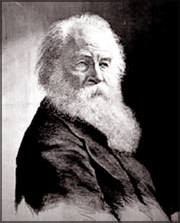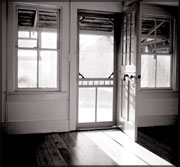|

Sir Thomas Mallory’s ‘Morte d’ Arthur’ and the dark ages
By Carl Muller
As promised, I give readers an excerpt from “Morte d’ Arthur, and I
would like to use the same spellings as in the original in telling of
“Howe Arthur by the means of Merlin gate Excalibur his sworde of the
Lady of the La ke.”
We must mind that “Merlin” was the old spelling (now Merlyn) and
“gate” is got. Anyway, here goes: “Righte so the kyng (also spelt
“kynge” - now “king”) and he departed and wente until as ermyte (hermit)
that was a good man and great leche (healer).
Soo the heremyte serched all his woundys and gaf hym good salves, so
the kyng waas there thre dayes and thenne were his woundes well amendyd
that he might ryde and goo and so departed...
Soo they rode tyl they came to a lake, the whiche was a fayr water
and brood, ad in the middes (middle) of the lake Arthur was ware of an
arme clothed in white samyte, that held a fayr swerd in that hand...
With that they save a damosel goyng upon the lake....Anone with all came
the damoysel unto Arthue and salewed (saluted) hym and he her ageyne
(again) .... “Syr Arthur kynge” said the damoisel, “go, ye into yonder
barge and rowe yourself to the swerd, and take it and scaubart
(scabbard) wit you, and I will aske my yefte (gift) when I see my tyme.”
So syr Arthur and Merlin alight and tayed (tied) their horses to two
trees and so they went into the ship and when they came to the swerd...
Arthur took it up by the handles and and took it with hym - and the arme
and the hand went under the water...” I must remind that he hermit was
called “leche” that told that he was a healer who used the leech to draw
out bad blood.
You must know that the intellectual life of England was centred
mostly in Oxford and Cambridge. Since 1200, Oxford was the seat of a
great university.
Cambridge University came in in 1229. But the early history of both
institutions was known for their many brawls between the townsmen and
the dons. Students with no money wielded shovels as carriers of earth,
coal and bricks. They became waiters, begged in the streets and even
went door to door singing.
The faculties were exclusively made up of members of the clergy and
undergrads had to follow the Trivium - a course of study comprising
grammar, logic and rhetoric. Having mastered these, they were proclaimed
“Artium Baccalaureus” - Bachelor of Arts - and then went on to the
Quadrivium - arithmetic, geometry, music and astronomy.
To pass out in these meant earning the degree of “Artium Magister” -
Master of Arts. Thereafter, the student passed no written exams but had
to debate in public and deliver lectures. Naturally, there arose many
pedants with no all-round grip of affairs.
Also, Science was taboo. To show any interest in Science was to admit
to an alliance with the devil!
This was certainly an age of darkness, and England was resured from
it in the 16th century by two great world movements - the Renaissance
and the Reformation. This will take us, in my next article, to the
Renaissance (1500-1600). Don’t forget, Renaissance means “New Birth” and
this made the world bigger - physically, intellectually and morally.

Walt Whitman - Relishing simplicity of poetry
Walt Whitman was born in Long Island New York, on May 31, 1819, the
son of a Quaker carpenter. Whitman’s mother descended from Dutch
farmers. In Whitman’s childhood slaves were employed in the farm.
Whitman developed an early love for nature. He read classics in his
youth and was inspired by writers such as Goethe, Hegel, Carlyle and
Emerson.
He left school early to become a printer’s apprentice. In 1836, at
the age of 17, he began his career as a teacher in the one-room school
house of Long Island.

He continued to teach until 1841, then adopted journalism as a
full-time career. He founded a weekly newspaper, Long-Islander, and
later edited a number of Brooklyn and New York papers.
After that he held a great variety of jobs while writing and editing
for several periodicals, The Brooklyn Eagle from 1846 to 1848 and The
Brooklyn Times from 1857 to 1858.
In between he spent three months in a New Orleans paper, working for
his father, and earning his living from undistinguished hack-work. On
his return to Brooklyn in the fall of 1848, he founded a “free soil”
newspaper, the Brooklyn Freeman.
Whitman maintained that a poet’s style should be simple and natural,
without orthodox meter or rhyme. The poems were written to be spoken,
but they have great variety in rhythm and tonal volume.
The central theme arises from Whitman’s pantheistic view of life,
from symbolic identification of regeneration in nature. Whitman’s use of
free verse had a deep influence on poetry. Whitman struggled to support
himself through most of his life.
In Washington he lived on a clerk’s salary and modest royalties, and
spent any excess money, including gifts from friends, to buy supplies
for the patients he nursed. He had also been sending money to his
widowed mother and an invalid brother.
From time to time writers both in the states and in England sent him
“purses” of money so that he could get by.
In the early 1870s, Whitman settled in Camden, where he had come to
visit his dying mother at his brother’s house. However, after suffering
a stroke, Whitman found it impossible to return to Washington.
He stayed with his brother until the 1882 publication of Leaves of
Grass gave Whitman enough money to buy a home in Camden. In the simple
two-story clapboard house, Whitman spent his declining years working on
additions and revisions to a new edition of the book and preparing his
final volume of poems and prose, Good-Bye, My Fancy (1891).
After his death on March 26, 1892, Whitman was buried in a tomb he
designed and had built on a lot in Harleigh cemetery.
Compiled by Ishara Mudugamuwa
[email protected]

Lethargy in the Council
by A. F. Dawood
It is quarter past nine on a Monday morning and the Municipal Council
in an urban city is deserted; all the fans in all the department are
working at full speed but the seats are empty.
The Planning Division, Engineering Division and Finance Division are
deserted and the employees are yet to report for work. Only a few peons
are seated and chatting about. A few people who have come for various
transactions are seated in the available few chairs and some are hanging
about in the corridors for their saviours to arrive.
For the fifth time in two weeks, Sigera climbs the staircase
tirelessly with a file in his hand. He goes to a peon who relates to his
colleagues a heroic deed of his experience in a stentorian voice.

“Here has the engineer come?” The peon continues his talking assuming
an air of importance. Sigera interrupts him by repeating the question.
He stops and looks at Sigera. “What you want?” “Has the engineer come”
“I don’t know, wait and see.” “This is the fifth time I have com here;
mine is a small work.”
“That’s what I told you to sit and wait till he comes.” Sigera
manages to find a seat to rest his tired bones. He glances at the wall
clock opposite to him. It is nine thirty in the morning. One by one the
workers start trooping in but the heads of the departments are still
missing.
A saree clad employee rushes to her seat, then wends her way to the
bathroom with her handbag. Her friends who had just entered the office
asks her. “Aney, where’re you going?” “I’m going to comb my hair and do
a little make up.” “Wait Niluka, I’m also coming.” By 9.40 in the
morning about nine to ten workers have come.
A woman employee in a tight skirt and high heeled shoes wends her way
to the common room, carrying a bottle of water and a packet. Most
probably she is going to have her breakfast. “Missi, missi, I have
brought the number of ......” Sigera runs behind her.
“Wait a little, wait a little.” She says and disappears in the
corridor. One male clerk is reading the paper and another is smoking a
cigarette. The peon to whom Sigera spoke earlier comes to him.
“Mahattaya, what’s your problem?” “I want to get a certified copy of my
house plan. I want to meet the engineer. “You’re wasting your time
meeting the engineer; there’s a short cut method to get your certified
copy.”
“Then tell me what I should do?” “I can’t tell you here, people are
here. Meet me after three in the afternoon at the gate. Ask for Karu,
then I’ll come.”
A person who overhears this conversation remarks. “That’s the way
things are done here.” Sigera looks at him. You’re Mr.?” “ I’m Lambert;
I also got my certified copy the way Karu told.” “Sure? How much you
paid?” “There’s a woman in the Record Room. She will ask you Rs. 2,000
to give you the copy. But you can bargain and come down to Rs. 1,500”
“Such a big amount?” Sigera expresses surprise.
“Otherwise you’ll never get it; if you give a letter to the engineer
he will pass it to the Record Room, and say our Record Room went under
fire; if we have the record we will issue you a certified copy. The
matter ends there.” “Is that so? Now why’re you here?” Sigera questions
Lambert. “Just to get my COC, man; How many days I came here?” “Why the
officer has not approved your building?” “It’s not that”, Lambert
explained, “one fellow came to inspect my house and he was telling this
and that. I gave him Rs. 1,500 and got it approved. For everything you
have to pay money.”
It is ten in the morning and the engineer walks in. Lambert meets the
engineer in his cubicle. “Ah; you came yesterday also, no?” “Not only
yesterday, I have come here more than eight times.” “What’s your
problem?” “My COC file is missing and every day the clerk is telling me
to come tomorrow, come tomorrow. What’s the meaning of this?” Lambert
reproaches.
“What the number of the file?” “BP/81/2000C” The engineer summons a
peon. Siri comes running and the engineer gives the file number to him.
Lambert goes behind him.
“Mahattaya, we looked for the file yesterday also, no? I don’t know
where to find this file.” “Can a file get lost like this?” Lambert
queries. “Hold on mahattaya, I’ll check it in the other section.” After
sometime he comes he comes and tells the file cannot be traced.
“Siri, any how trace my file I’ll give you something.” “Anyhow I’ll
trace the file.” Siri enters a room and the next moment he comes with
the file. If a bribe is given, hidden files come out. Although Lambert
has visited the Council for two weeks, his file has not been minuted by
an officer; so he is waiting for the subject clerk to report for work.
Suddenly Sigera bumps in to an acquaintance. “Hello, Mr. Perera, what
brings you to this wretched place?” “I have come to get my COC. This is
my seventh visit.” “Why the file is missing?” “No, the file is not
missing but the wretched woman who handles this is not in her seat.” Mr.
Perera goes to a female clerk and greets her ‘Good Morning’. The clerk
carries on her work quite unconcerned about his presence. Mr. Perera
stands near her patiently. After sometime she raises her head. “Yes, for
what have you come here?”
“Mrs. Pathirage absent today?” Mr. Perera questions. “I don’t know,
you ask the chief clerk.” Mr. Perera puts the same question to the chief
clerk. “Yes, Mrs. Pathirage is absent” “Then what about my COC? It has
to be signed by someone to be sent the Valuation department” “You better
go to Mrs. Hanwella. “Mr. Perera goes to Mrs. Hanwella.” “Miss, can you
please sign my file and send it to the Valuation Dept?” “It’s not my
job; the subject clerk will do it.” “But she is absent today, isn’t
there anyone to do this?” “Then you come tomorrow.”
By 10.30 in the morning half the Council workers are in the canteen
for their tea. Many of the sectional heads are not in their seats.
Indiscipline, negligence and lethargy is the order of the day in the
Council. By 12.30 in the afternoon, the employees go for lunch; the
doors to the entrance to the halls are closed, and some people who have
come in the morning for their work are still loitering in the corridors.
A peon comes to Mr. Perera, “Sir, if you have given something to me,
I would have put your file to the clerk, no? Then all this trouble is
not there.” “Hm”, Mr. Perera says, “Now what can I do?” “Sir, take care
of your file till that Miss Comes; sometimes file can get lost.” The
peon threw a glance at Mr. Perera and he understood the message. He
looked her and there, and dipped his hand into his coat pocket; he took
out a hundred rupees note to oil the peon’s palm.
“Sir, don’t worry, I’ll look after your file.” By three in the
afternoon, a paroxysm of urgency sweeps across the Council employees;
their eyes are glued to the clock.
So they hurry and scurry to the female bathroom with their pouch of
make up kit; some are in their seats busy powdering their face and
painting their lips; some are reading Sinhala magazines; male employees
are busy arranging their brief cases or reading the result from the
betting sheet.
A woman goes to a female employee who is fully engrossed in a
magazine. “Aney, missi, I’ve to submit my application for an assessment
number for my new house.” Now closing time, come tomorrow.”
The female employee tells without even raising her head. Another
woman meets a male clerk who is sipping plain tea. He submits a letter
regarding an unauthorised wall. “What’s this?” “A request to demolish an
unauthorised wall. Can you file this?” “Engineer is not here, come
tomorrow.” By 4.30 in the evening, the employees start moving out in
twos and threes.
Disgusted of the work in the Council, Lambert walks down the steps,
deciding to visit the Council for the ninth time on the morrow. Perera
too decides to visit on the following day, to get his file minuted. At
least he is sure the file will be there because he has paid Rs. 100 to
the peon.
These two come face to face with Sigera, who was waiting at the gate.
“Whom are you waiting for?”
“Waiting to meet that peon Karu.”

No longer a home

The helpful bird has flown away,
The tree of love has died;
The bird of kindness has lived its day
Never to return is the tide.
The joyous sun is wearied out,
The trusted moon is gone;
The fun filled stars not seen about,
A cloud floats alone.
No happy laughs, no yells, no calls,
No hearts - soft and warm;
Just a roof with four blind walls,
A house - no longer a home.
Minoli WIJETUNGA
Under the tree

Under the tree,
The moon awakens,
Lost from her twilight grove;
Under the tree,
A battle rages,
Blood and bone and saws;
Under the tree,
Lovers kiss,
Snakes hiss,
A tale of blackened bliss;
Under the tree,
The moon rises,
Her hands on her silver sword;
Under the tree - but there is no tree
Nothing;
Nothing to see.
Yudhanjaya WIJERATNE
The sign
Hear my voice, again and again,

A rumbling towards one direction....
From the grey,
Dampened heaven,
To the living human’s plane.
Hear my voice, at times....
A mocking laughter,
At times a roaring pain.
Hear I come, with a sound
To some, that is threatening,
A sound that keeps...
The windows rattling with Life,
The children awake in fright,
The lonely woman praying
And a farmer...contemplating...
Of a hopeful rain.
Ishani GOONASEKARA |
